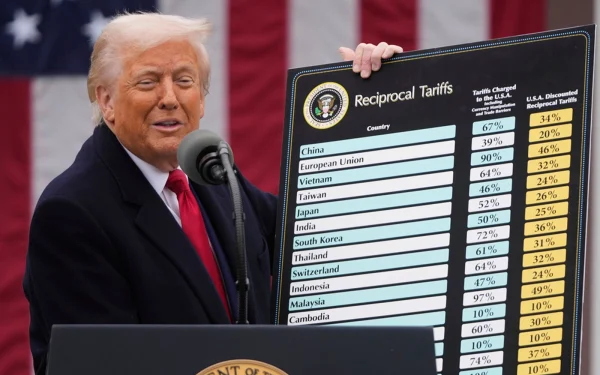On April 3 and April 4, 2025, the US stock market experienced the worst losses since March 2020, when COVID shut down the entire world. The Dow Jones Industrial Average—which is a 30-company index that many experts look towards for general market data—fell over 1,600 points (-4%) on April 3, and plummeted over 2,200 points (-5.5%) on April 4. This two-day combined loss of over 3,800 points was the first time in history that the Dow fell more than 1,500 points on two consecutive days. And in this time period, the market lost $6.6 trillion in value, according to the Wall Street Journal. The S&P 500 index reported losses of 4.8% and 6% on the two days respectively, while technology companies were particularly affected, as the Nasdaq Composite index dropped 6% on both days.
The reason behind this sharp downturn was President Donald Trump’s “Liberation Day” tariffs announcement, the most extensive tariffs since the Smoot-Hawley Tariff Act in 1930 that triggered a global trade war and contributed to the Great Depression. The tariff consists of a 10% tax on all imported goods, along with further tariffs on numerous specific countries, according to the Center for Strategic & International Studies. The specific trade partners that have been targeted by the additional “reciprocal tariffs,” are those that already have tariffs in place against US goods. The Trump administration states that part of their motive for these taxes is to penalize countries that currently have unfair trade restrictions against the US. Most notably, the additional tariffs include a 34% tax on imported goods from major trade partner China, a 32% tax on Taiwan, a 46% tax on Vietnam, and a 20% tax on the European Union.

Unfortunately for Wall Street investors, the market reacted unfavorably to President Trump’s tariff announcements, resulting in the two devastating sell-off sessions. The market’s performances on Thursday and Friday drove the CNN Business Fear & Greed Index down to a 3/100, which indicates that extreme fear is driving the market. A recession is also seeming more and more probable, as major brokerage J.P. Morgan raised their global recession probability in this upcoming year from 40% to 60% after the announcement of President Trump’s tariffs.
“Disruptive U.S. policies have been recognized as the biggest risk to the global outlook all year,” the firm said in a statement explaining the rise in recession probability. “The effect … is likely to be magnified through [tariff] retaliation, a slide in U.S. business sentiment and supply-chain disruptions.”
As it would turn out, the market did not suffer for long. On Wednesday, April 9, President Trump posted an update to his Truth Social account, announcing that tariffs would be paused for 90 days and remain at a universal 10% tariff level for all countries except China. China had retaliated a few days earlier with tariffs of their own, sparking a back-and-forth increase in tariffs by both countries. As it stands, the US announced 125% duty on Chinese goods, hours after China levied a 84% duty on US goods.
When President Trump made this announcement, the US stock market skyrocketed for a historic market rally. According to CNN, The Dow rose almost 3,000 points (7.87%) on its best day in five years, the S&P 500 gained 9.5% and had its best day since 2008, and the Nasdaq composite posted a 12.6% increase, marking its best day since January 2001 and second highest single-day gain of all time. Technology stocks led the rebound, with major companies like Apple, Microsoft, and Nvidia each gaining over 10% in price.
“The market’s move upward is violent, and speaks to how badly the market was looking for clarity on this issue,” said Chris Brigati, Chief Investment Officer at a San Antonio-based investment bank.
While uncertainties remain, the volatility of the stock market over the past week highlights the sensitivity of financial markets to trade policies and political decisions. Investors and policymakers will continue to keep a watching eye over President Trump’s policies during this time of uncertainty. For now, the recent stock market events serve as a compelling reminder as to why it is crucial to stay informed as an investor.












































































































































